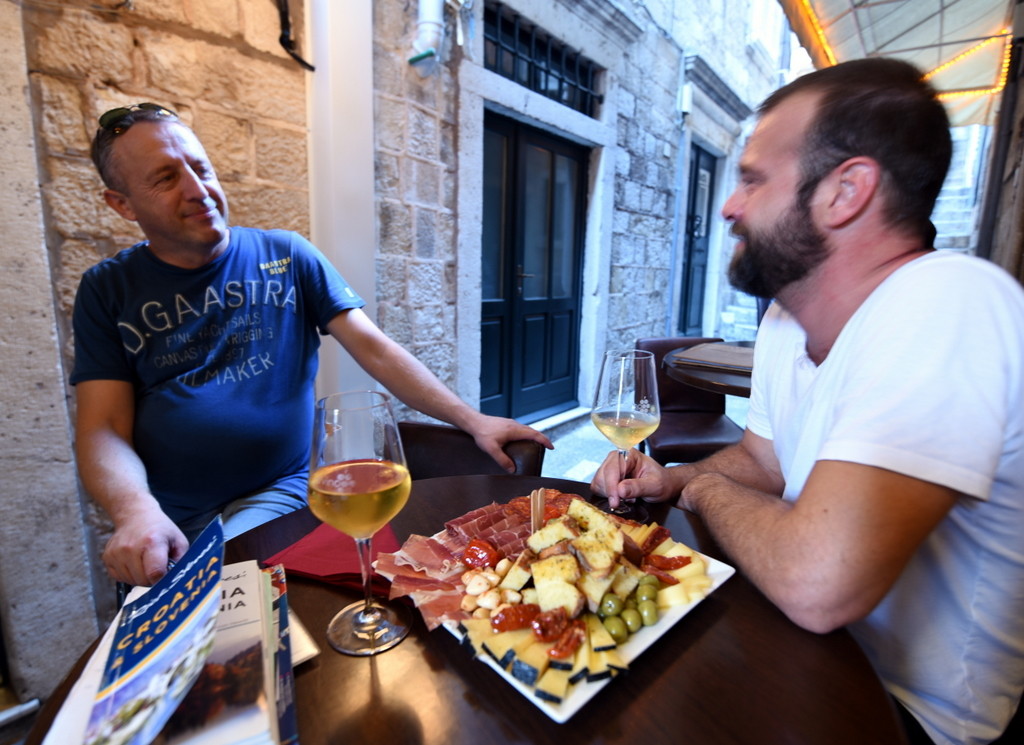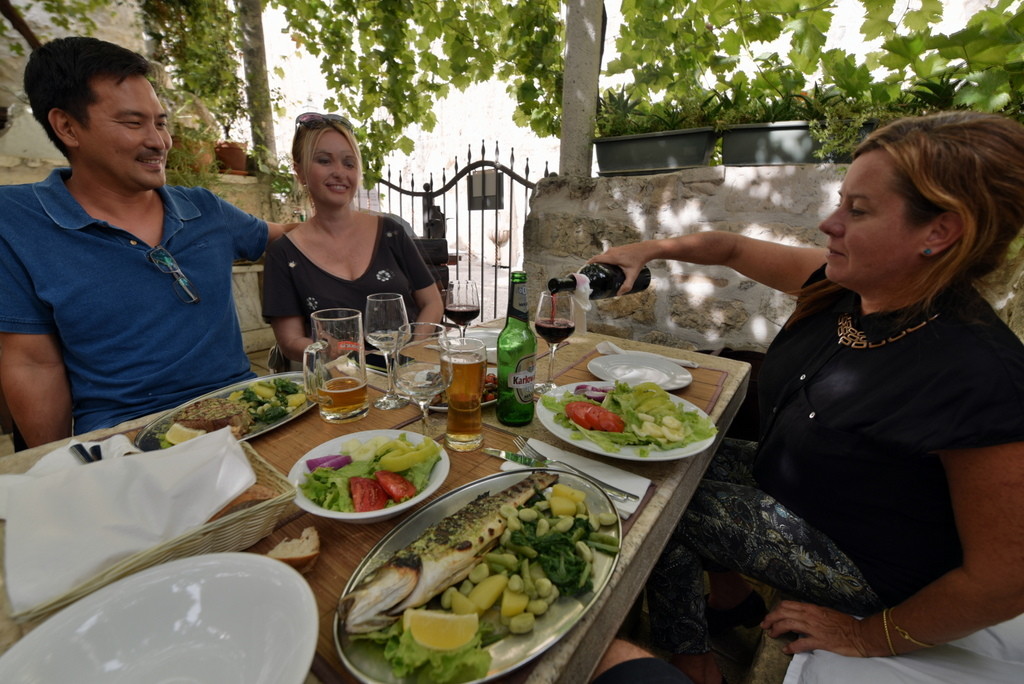Dubrovnik is just about the only place in my guidebook research work where I have to budget extra time simply to socialize. From B&B owners, to local tour guides, to the guy who runs the town’s best wine bar, everyone loves to catch up. Despite the city’s fame and glitz, deep in its soul, it’s still a tight-knit community… and I’m honored to be one of the gang.
But you don’t have to come here frequently to be a part of Dubrovnik. One thing that distinguishes the “Rick Steves travel philosophy” is people-to-people connections. And I recommend plenty of wonderful people in the Dubrovnik chapter of my Rick Steves Croatia & Slovenia guidebook. They’d love to meet you — and I’m happy to introduce you.
For example, there’s Jadranka Benussi, who rents apartments at her home on the hillside just outside of Dubrovnik’s Old Town. Climbing a steep stepped lane from the congested main street, you emerge into a chirpy garden terrace with views over red rooftops, medieval forts, and the shimmering Adriatic. Anytime I’m in town, I have to block off an hour or so to come visit Jadranka and update her details for the guidebook — and, of course, to relax in her garden and enjoy her company.
Today Jadranka asked me how old Rick was. Turns out he’s the same age as her husband, Milan. “That explains it,” she said. She reminded me that when Rick (then age 50) first listed her place in our guidebook, he described Jadranka and Milan as “a young professional couple.” The next year, I (then age 30) came to update Jadranka’s listing, and when the new edition came out, she noticed that the description changed to “a middle-aged professional couple.” “I’m just hoping you don’t decide to send somebody in their 20s,” she joked. “I’m not ready to be ‘an old professional couple’ yet.”
Sasha, a gregarious Aussie with Croatian roots, runs DiVino Wine Bar, tucked a half-block off Dubrovnik’s main drag. Sasha has an infectious passion for Croatian wines. On this trip, I enjoyed catching up with him at one of his sidewalk tables. We dug into a huge platter of Dalmatian antipasti — little wedges of pungent, hard cheese; salami, prosciutto (called pršut here), and air-cured beef tenderloin; and marinated sun-dried tomatoes and olives. He showed me his latest creation: a small, sweet, and tangy red pepper, stuffed with anchovy paste and marinated. To avoid dripping oil everywhere, you eat it in one explosive gulp. Delicious. As we were chatting, the guy who provides some of his produce happened to walk by and admired his own handiwork.
Marc Van Bloemen, who runs one of Dubrovnik’s longest-standing little guest houses, is of Canadian and English descent. But he’s lived here most of his life, speaks fluent Croatian, and strikes me as more local than many locals. I see Marc as Dubrovnik’s conscience — he’s the guy you can count on to organize when something smells corrupt. I think he should run for mayor… but he’s probably already burned too many bridges for that.
Jon and Sanja are a Canadian-Croatian couple who opened Dubrovnik’s first and best independent hostel many years ago, about the time I first came here. Back then, their hostel’s little food counter was the only place in town (and probably in all of Croatia) where you could get a decent burrito. I’ve enjoyed watching their evolution as ambitious young business owners in a country where ambition and vision aren’t always welcome. Their party hostel, with all of its noise complaints, was replaced first with a tamer hostel high on the hill, and now by a plush B&B in the heart of town — effectively catering to the same clientele who crashed here as backpackers, but now want a more refined experience. We had a great lunch of grilled fish, and I got to meet a new arrival, Alex, who’s also trying to find her niche in Dubrovnik. Her new business — making custom, high-quality picnics for beachgoers, hikers, and side-trippers — seems like it’ll be a hit.
When it’s time to leave town, I ask Pepo, a private driver, if he’ll take me to my next destination. I met Pepo purely by chance many years ago, liked him, and recommended him in our book. Since then, he’s taken hundreds of Rick Steves readers on day-trips.
Trying to reconcile the many different viewpoints that have sat in his passenger seat, Pepo quizzes me about the presidential race. (“So what’s your take on that Bernie Sanders?”) Turns out Pepo listens to NPR at breakfast and reads the New York Times. He may be better informed about American politics than some of his American clients. And yet, he explains that he enjoys just listening to the opinions of his clients, without sharing his own, or passing judgement. “You’re very wise,” I say. “I’m not wise!” he shoots back. “I’ve just talked to a million people.” (But isn’t that the same thing?)
Pepo took up arms to defend his hometown during the siege of Dubrovnik in the 1990s. Years ago, he drove me to the abandoned, half-destroyed fortress high on the hill above town. He showed me the Saturday Night Fever-style, light-up disco floor from the time when this was a popular nightspot. And then, as a grotesque contrast, he took me to the rooftop and told me about his experience during the war: trying to hold onto this fortress with just a few other local boys — knowing that the whole town was counting on them to weather the shells and bullets and preserve Dubrovnik’s freedom.
On this trip, when I update his details for the book, Pepo suggests that maybe it’s time to retire his description as “a veteran of the recent war.” He says that people just aren’t that focused on the war anymore, and — while he’s still happy to share his experiences with curious travelers — he wouldn’t mind moving on, too. (I see this as a very positive change.)
I ask Pepo why it is that, in Dubrovnik more than anywhere else in Croatia — and maybe in all of Europe — I find it so easy to build connections with people. He thinks it’s a product of their unique history. Like Venice, Dubrovnik was an independent city-state. Unlike Venice, it was almost completely surrounded by potentially hostile Ottomans. The community of Dubrovnik became adept at welcoming outsiders and building positive relationships. With this approach, trade increased and tributes decreased. Then, as their town was blown to bits during the war in the 1990s, people though they’d never have visitors here again. So, as throughout their history, they’ve worked hard to be good ambassadors for their city. And it has paid off.
“It’s too bad that so many people come to Dubrovnik in a hurry,” I say. “Cruise passengers in town for just a few hours will probably never see that intimate, community side of Dubrovnik that I get to enjoy so much.”
“Not necessarily,” Pepo says. “People in Dubrovnik want to connect. But they have to see that you want it, too. If you’re rushing through town, they’ll get out of your way. But if they notice you relaxing, lingering, and enjoying, they’ll want to join you. It is possible.”
Based on my experience, Pepo is right on. So this is our challenge to you: If you’re going to Dubrovnik, even for just a few hours, make a point to slow down. Linger. Nurse a coffee. Sit on the church steps. Be open to the people. And you might just make a new friend.



looking forward to connecting with the people of Dubrovnik next Fall on our travels through Slovenia and Croatia.
I just returned from the Best of the Adriatic tour, which was amazing. I don’t think I’ve ever had a trip that was such a combination of fanstastic scenery and historical sights, while also being educational and even sobering at times. It’s hard to believe that these countries were Communist 20 years ago, and now all the locals really seem to enjoy their cities and take full advantage of all those cities have to offer.
I’m re-reading the guidebook now, as I can better appreciate all of the information, and can also re-live the sights we saw.
Thank you for an amazing trip and all of the incredible information and history in the guidebook.
Thank you for your wonderful blog.
The Sacha you refer to, was he a holiday rep in Mljet and Dubrovnik June 1988?